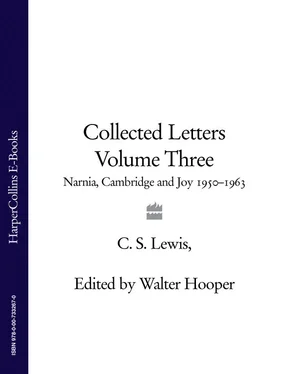But it did not happen, however, without sins on our part: for that justice and that care for the poor which (most mendaciously) the Communists advertise, we in reality ought to have brought about ages ago. But far from it: we Westerners preached Christ with our lips, with our actions we brought the slavery of Mammon. We are more guilty than the infidels: for to those that know the will of God and do it not, the greater the punishment.
Now the only refuge lies in contrition and prayer. Long have we erred. In reading the history of Europe, its destructive succession of wars, of avarice, of fratricidal persecutions of Christians by Christians, of luxury, of gluttony, of pride, who could detect any but the rarest traces of the Holy Spirit?
Let us pray always. Farewell,
C. S. Lewis
TO SISTER PENELOPE CSMV(BOD):
Coll Magd.
Jan 9th 1953
Dear Sister Penelope
As usual, your letter is full of interest, and I shall chew it over very thoroughly. That is, I shall go on wondering whether ooa can mean quite the same as  13 and whether it is or is not an objection that your interpretation involves the assumption that what is being prayed for is something internal. One couldn’t (or could one?) believe that a dead man had risen before you saw him rise. I don’t know. You might believe the prayer had been answered before he did. By the way, what are Aramaic tenses like? Does it have futures and preterits?
13 and whether it is or is not an objection that your interpretation involves the assumption that what is being prayed for is something internal. One couldn’t (or could one?) believe that a dead man had risen before you saw him rise. I don’t know. You might believe the prayer had been answered before he did. By the way, what are Aramaic tenses like? Does it have futures and preterits?
The poor old soul in Holloway is a famous confidence trickster, Mrs. Hooker, against whom I had to appear as a witness because she had borrowed money by pretending to be my wife! I am sure you will pray for her. It was nice to meet the other day.
Yours sincerely
C. S. Lewis
TO J. O. REED (P): TS
REF.34/53.
Magdalen College,
9th January 1953.
Dear Reed,
Can you meet me for a pot of beer in the Eastgate at 12.30 tomorrow, Saturday 10th?
Yours,
C. S. Lewis
TO DON GIOVANNI CALABRIA (V):
E Coll. Stae Mariae Magdalenae
apud Oxonienses
Jan. xiv LIII
Pater dilectissime
Multo gaudio accepi epistolam tuam die ix Jan. datam: credo jampridem te meam accepisse quam de tractatu Responsabilità scripsi. Et vides me per errorem putavisse te auctorem esse et Sac. P. Mannam esse id quod Galli vocant nomen plumae . At minime refert quum liber De Imitatione nos doceat ‘Attende quid dicatur, non quis dixerit’. Multas ex corde gratias refero, quia tanta caritate ob libellum meum propositum meditare et orare voluisti. Sententiam tuam pro signo accipio. Et nunc, carissime, audi de quâ difficultate máximo haesito. Duo paradigmata orationis videntur nobis in Novo Testamento expósita esse quae inter se concillare haud facile est. Alterum est ipsa Domini oratio in horto Gethsemane (‘si possibile est…nihilominus non quod ego volo sed quod tu vis’). Alterum vero apud Marc XI, v. 24 ‘Quidquid petieritis credentes quod accipietis, habebitis’. (Et nota, loco quo versio latina accipietis habet et nostra vernacula similiter futurum tempus shall receive , graecus textus tempus praeteritum έλάβετε, accepistis, id quod difficillimum est). Nunc quaestio: quomodo potest homo uno eod-emque momento temporis et credere plenissime se accepturum et voluntati Dei fortasse negantis se submittere? Quomodo potest dicere simul ‘Credo firmiter te hoc daturum esse’ et ‘si hoc negaveris, fiat voluntas tua’. Quomodo potest unus actus mentis et possibilem negationem excludere et tractare? Rem a nullo doctorum tractatam invenio.
Nota bene: nullam difficultatem mihi facit quod Deus interdum non vult faceré ea quae fidèles petunt. Necesse est quippe ille sapiens et nos stulti sed cur apud Marc. XI 24 pollicetur se omnia (quidquid) facere quas plena fide petimus? Ambo loci Dominici, ambo inter credenda. Quid faciam? Vale. Et pro te et pro congregatione tua oro et semper orabo.
C. S. Lewis
*
from The College of St Mary Magdalen
Oxford
14th January 1953
Dearest Father
I received your letter dated 9th Jan. with much joy. I trust that long since you have received my letter on the tract Responsabilità . And you see that I mistakenly thought that you yourself were the author and that ‘Sac. P. Mannam’ 14 was what the French call a nom de plume .
But it is of no consequence since the De Imitatione teaches us to ‘Mark what is said, not who said it.’ 15
I send you many heartfelt thanks for your charity in being willing to meditate on my proposed little book 16 and pray for it. I take your opinion as a good sign.
And now, my dearest friend, hear what difficulty leaves me in most doubt. Two models of prayer seem to be put before us in the New Testament which are not easy to reconcile with each other.
One is the actual prayer of the Lord in the Garden of Gethsemane (‘if it be possible 17 …nevertheless, not as I will but as Thou wilt’). 18
The other, though, is in Mark XI v. 24. ‘Whatsoever you ask believing that you shall receive you shall obtain’ (and observe that in the place where the version has, in Latin, accipietis -and our vernacular translation, similarly, has the future tense, ‘shall receive’-the Greek text has the past tense έλάετε = accepistis -which is very difficult).
Now the question: How is it possible for a man, at one and the same moment of time, both to believe most fully that he will receive and to submit himself to the Will of God–Who perhaps is refusing him?
How is it possible to say, simultaneously, ‘I firmly believe that Thou wilt give me this’, and , ‘If Thou shalt deny me it, Thy will be done’? How can one mental act both exclude possible refusal and consider it? I find this discussed by none of the Doctors.
Please note: it creates no difficulty for me that God sometimes does not will to do what the faithful request. This is necessary because He is wise and we are foolish: but why in Mark XI 24, does He promise to do everything (whatsoever) we ask in full faith? Both statements are the Lord’s; both are among what we are required to believe. What should I do? 19
Farewell. And for you and for your Congregation I pray and shall ever pray.
C. S. Lewis
TO WILLIAM L. KINTER(BOD): TS
REF.51/53.
Magdalen College,
Oxford.
17th January 1953.
Dear Mr. Kinter,
Yes. Eustace, Edmund, Jane, and Mark 20 are all meant to be recipients of Grace.
All good wishes.
Yours sincerely,
C. S. Lewis
TO MARY WILLIS SHELBURNE (W):
Magdalen College
Oxford
Jan. 19th 1953
Dear Mrs. Shelburne
Thank you for your kind letter of Dec. 29th which arrived today. I am afraid I have no idea what the first editions of Screwtape or the Divorce sell at: I haven’t even got a first of the former myself. But you would be foolish to spend a cent more on them than the published price: both belong to the worst war-period and are scrubby little things on rotten paper–your American editions are far nicer.
Your letter was most cheering and I am full of agreements. Of course we’ll help each other in our prayers. God bless you.
Yours most sincerely
C. S. Lewis
TO BELLE ALLEN (L , WHL):
Magdalen College,
Oxford.
19 January 1953
I don’t wonder that you got fogged in Pilgrim’s Regress . It was my first religious book and I didn’t then know how to make things easy. I was not even trying to very much, because in those days I never dreamed I would become a ‘popular’ author and hoped for no readers outside a small ‘highbrow’ circle. Don’t waste your time over it any more. The poetry is my own…We all feel ashamed of receiving so much from you and are not even sure- now -whether our scarcities are any worse than your high prices. Don’t you think you ought to stop?…
Читать дальше

 13 and whether it is or is not an objection that your interpretation involves the assumption that what is being prayed for is something internal. One couldn’t (or could one?) believe that a dead man had risen before you saw him rise. I don’t know. You might believe the prayer had been answered before he did. By the way, what are Aramaic tenses like? Does it have futures and preterits?
13 and whether it is or is not an objection that your interpretation involves the assumption that what is being prayed for is something internal. One couldn’t (or could one?) believe that a dead man had risen before you saw him rise. I don’t know. You might believe the prayer had been answered before he did. By the way, what are Aramaic tenses like? Does it have futures and preterits?










